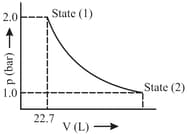Internal Energy and First Law of Thermodynamics
Internal Energy and First Law of Thermodynamics: Overview
This topic covers concepts such as Work Done in Isochoric Process, Work Done in Isothermal Process, First Law of Thermodynamics, Mathematical statement of First Law of Thermodynamics, Work Done in Reversible Adiabatic Process, etc.
Important Questions on Internal Energy and First Law of Thermodynamics
When mol of a gas is heated at constant volume, temperature is raised from K. If heat supplied to the gas is J, then which statement is correct?
If is the change in enthalpy and the change in internal energy accompanying a gaseous reaction, then
Internal energy and pressure of a gas per unit volume are related as:
moles of an ideal gas expands isothermally against a constant pressure of Pascal from L.The amount of work involved is
The ratio Kp to Kc of a reaction is 24.63 L atm mol–1 at 27°C. If heat of reaction at constant pressure is 98.8 kcal, calculate the heat of reaction (in kcal) at constant volume? (Report the value in the nearest integer)
(use values and )
A gas is enclosed in a cylinder with a piston. Weights are added to the piston, giving a total mass of . As a result, the gas is compressed and the weights are lowered . At the same time, of heat is evolved from the system. Calculate the change in internal energy of the system and report the answer in the nearest integer value
The ratio Kp to Kc of a reaction is 24.63 L atm mol–1 at 27°C. If heat of reaction at constant pressure is 98.6 kcal, what is the heat of reaction (in kcal) at constant volume?
The specific heat of a certain substance is . Assuming ideal solution behavior, the energy required (in ) to heat of molal of its aqueous solution from to is closest to :
[Given: molar mass of the substance ; specific heat of water ]
of a mono-atomic ideal gas is expanded from state to state as shown in the figure. Calculate the work done for the expansion of gas in Joules from state to state at .

The process in which the value of is:
A thermally insulated rigid container of volume contains a diatomic ideal gas at room temperature. A small paddle installed inside the container is rotated from the outside, such that the pressure rises by . The change in internal energy is close to
Find the change in the internal energy of a closed system, when denotes the amount of work done by the system and amount of heat is supplied to the system.
Which factors affect the internal energy ?
What do you mean by the internal energy of a substance?
One mole of an ideal gas at is expanded isothermally from an initial volume of to . The for this process is ( )
is mathematical expression for
A sample of gas absorbs of heat.
Suppose that as the original sample absorbs heat, it expands against atmospheric pressure and does of work on its surroundings. What is?A sample of gas absorbs of heat.
Suppose that in addition to absorption of heat by the sample, the surroundings does of work on the sample, what is ?
A sample of gas absorbs of heat. If volume remains constant, what is ?
In the reaction, if moles of react with moles of , then is equal to
